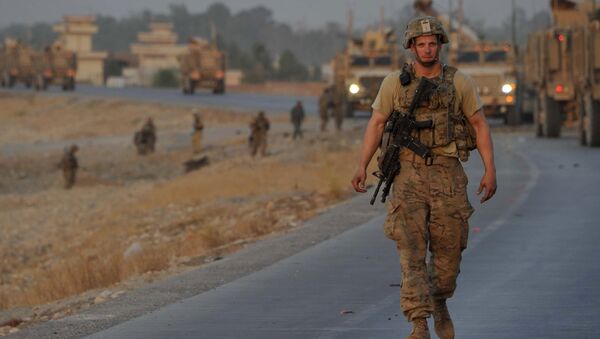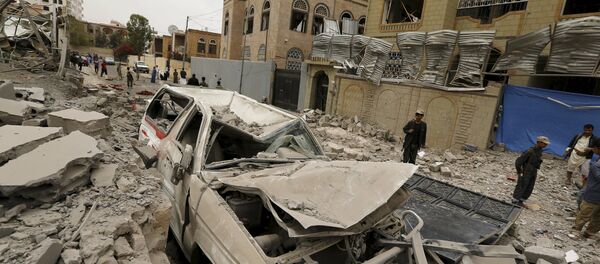Local officials said that the helicopter strike took place early this morning at an army outpost in the Baraki Barack district of the Logar province, 50 kilometres east of Kabul.
NATO airstrike hits Afghan Army post; 8 troops killed http://t.co/cEf44dFmsk pic.twitter.com/Kow3RKgzTj
— Mike Walker (@New_Narrative) 20 июля 2015
While Afghan security officials have confirmed the death toll at eight, news agency AFP reported that 10 people had been killed in the helicopter attack, while US officials confirmed that some of its troops had been involved in an incident in the area.
If confirmed, it would be Afghanistan's deadliest friendly fire incident involving international troops since 2001.
While US-led NATO forces pulled out of Afghanistan in December, an international coalition force of 10,000 troops has remained in the country to help local authorities with training and counterterrorism operations.
4 Out Of Every 10 Militants Fighting In #Afghanistan Are Foreigners: MoD (F.P.) pic.twitter.com/EH6e3pj4Qh
— Terrormonitor.org (@Terror_Monitor) 20 июля 2015
Friendly Fire: History of Civilian Losses From Western Intervention
The deaths of the Afghan servicemen, following on from a similar NATO air strike that killed five civilians in December, has once again highlighted the impacts international military operations have had on the civilian populations of countries hosting NATO operations.
#Afghanistan 's ghost buildings: US legacy of wasted millions of $ on unneeded infrastructure http://t.co/MfQ1HN1LLb pic.twitter.com/7gak7boLSD
— Phelim Kine 林海 (@PhelimKine) 20 июля 2015
Among these interventions was the highly controversial NATO bombing of Serbia in 1999, with international estimates suggesting that about 500 Serbian civilians were killed.
Despite international agencies placing an estimate on the death toll, it has been difficult to pinpoint the exact number, with Serbian government estimates suggesting that up to 2,500 people were killed as a result of the three-month air campaign.
More than a decade after the bombing of Yugoslavia, NATO forces from the US, UK, France and Canada undertook an aerial campaign in 2011 to depose the government of then Libyan leader Muammar Gaddafi, whose army had been accused of conducted airstrikes against rebel groups during the Libyan civil war.
Following the air raids, a United Nations Human Rights Council report found that 60 civilians were killed and a further 55 were injured as a result of the NATO air campaign.
@GBabeuf @Inthepeninsula Did NATO bring peace & prosperity to Libya, Tunisia, Yugoslavia, Afghanistan, Iraq, Ukraine or Cyprus…..??
— alan young (@alanyou47709777) 20 июля 2015
However, on top of the civilian casualties, many have argued that the western bombing of Libya has left the country in an increasingly volatile and violent state, with the ongoing civil war creating a huge humanitarian crisis, with rebel groups still fighting against government forces for control of the country.
“@Morning_LY: #Libya Jihadists 'graduating' from #AnsaralSharia's camps in #Benghazi's districts pic.twitter.com/0va3sv47zw” Thank you #NATO
— Mats Nilsson (@mazzenilsson) 20 Март 2015
History Repeats: Civilians Still Suffering From Western Attacks
And while these previous interventions from western forces have been widely criticized by many, others have highlighted the ongoing military operations that are having equally devastating impacts on civilian populations.
The Saudi Arabian-led coalition's bombing campaign of Yemen — for which the US is providing intelligence and logistical support — is among those that has had a devastating impact on the local population.
While designed to crush the uprising from Houthi rebel groups, the air raids, combined with the naval blockade, have led to a severe humanitarian crisis, with the UN declaring its highest state of humanitarian emergency in the country.
The fighting, along with the blockade has left 80 percent of Yemen's population (21 million) in urgent need of vital forms of aid, such as water, food and medical supplies.
There has also been a heavy human cost, with the UN estimating that about 1,500 civilians have died as a result of the fighting since March this year.
JUST OUT: Latest Situation Report on the #Humanitarian Emergency in #Yemen: http://t.co/Xjoudalt3w via @OCHAYemen pic.twitter.com/q7QmwR7FGV
— UNOCHA (@UNOCHA) 16 июля 2015
Despite widespread opposition to the commonly used approach of western airstrikes, governments have continued the practice as part of their efforts to defeat Islamic jihadists in Syria and Iraq.
Iraq in particular has suffered horrifically from western intervention, with heavy civilian losses stemming from the decade-long military US and UK-led invasion in the country.
#Iraq WH National Security Statement on Recent #ISIS Attack in #Diyala that left 300 fatalities/casualties. @NSCPress pic.twitter.com/YgkMEwl24Q
— Luay لؤي الخطيب (@AL_Khatteeb) 19 июля 2015
With widespread debate over the number of casualties from the combat in Iraq, the Iraq Body Count project (IBC) stated that up to 120,000 civilians were killed in the country, but has noted that since their figures are based on reports from media organizations and non-government bodies, the real number is likely to be higher.
Retired General: Drones Create More Terrorists Than They Kill, Iraq War Helped Create ISIS http://t.co/Vj1aBjmOIf pic.twitter.com/A7NdWaHqdi
— The Intercept (@the_intercept) 16 июля 2015
As a result, many politicians and activist groups were highly critical of the US-led coalition's decision to carry out airstikes against ISIL forces in Iraq and Syria, with a concern that western powers hadn't learned the lessons of previous interventions, and that the bombing would have a long-lasting devastating impact on the local population.




